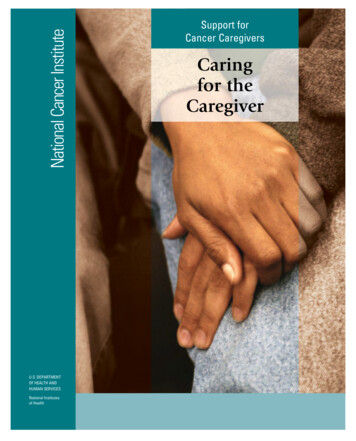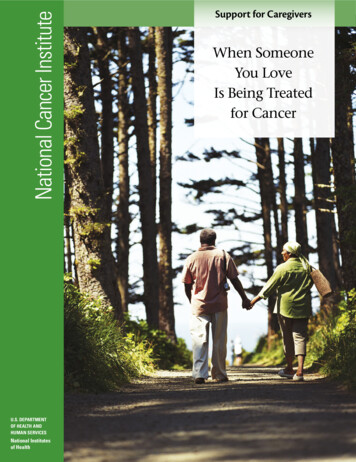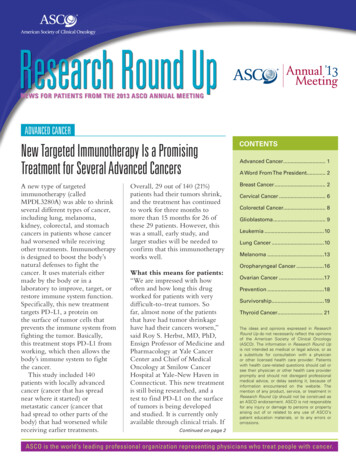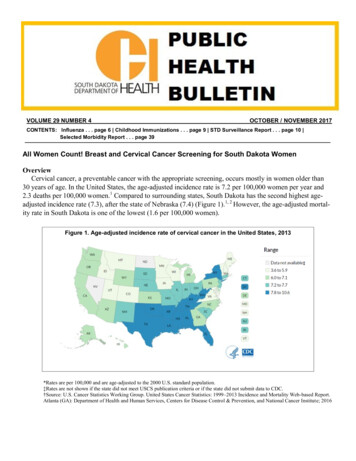
Transcription
National Cancer InstituteU.S. DEPARTMENTOF HEALTH ANDHUMAN SERVICESNational Institutesof HealthSupport forCancer CaregiversCaringfor theCaregiver
The National Cancer Institute (NCI) booklet, WhenSomeone You Love Is Being Treated for Cancer,contains more detailed information for caregivers.To view or print this booklet, go to our website atwww.cancer.gov. For more information call the NCIat 1-800-4-CANCER (1-800-422-6237).
Caring for the Caregiver“You need to learn ways to take care ofyourself. Because if you’re not taking careof yourself, you can’t take care of anyoneelse. Don’t be afraid to ask questions.Don’t be afraid to ask for help.” —JaneInside This BookletWho Is a Caregiver? .1Your Feelings.2Asking for Help .4Caring for Yourself .6Going With Your Loved One to Medical Visits .9Talking With Others .12Remember .15
Who Is a Caregiver?Are you helping a loved one get through cancer treatment? If you are, then thisbooklet is for you. You are a “caregiver.”You may not think of yourself as a caregiver. You may feel you are doing somethingnatural. You are just caring for someone you love. Some caregivers are familymembers. Others are friends.What does “giving care” mean?Giving care can mean helping with daily needs. These include going to doctor visits,making meals, and picking up medicines. It can also mean helping your lovedone cope with feelings. Like when he or she feels sad or angry. Sometimes havingsomeone to talk to is what your loved one needs most.While giving care, it’s normal to put your own needs and feelings aside. But puttingyour needs aside for a long time is not good for your health. You need to take careof yourself, too. If you don’t, you may not be able to care for others. This is whyyou need to take good care of you.A New RoleWhether you’re younger or older, you may find yourself in a new role as a caregiver.You may have been part of someone’s life before cancer, but maybe now the wayyou support that person is changing. For example, you may be taking care of yourspouse who has always been healthy or an adult child taking care of your parent.Whatever your roles are now, it’s normal to feel confused and stressed at this time.If caregiving feels new to you, try not to worry. Many caregivers say that they learnmore as they go through their loved one’s cancer treatment. And if you need to, tryto share your feelings with friends, a counselor or a support group. Many caregiverssay that talking with others helped them. They feel they were able to say things thatthey couldn’t always say to their loved ones.1
Your FeelingsIt’s common to feel stressed and overwhelmed at this time. Like your loved one,you may feel angry, sad, or worried. Try to share your feelings with others who canhelp you. It can help to talk about how you feel. You could even talk to a counseloror social worker.Understanding your feelingsYou probably have many feelings as you take care of your loved one. There is noright way for you to feel. Each person is different.The first step to understanding your feelings is to know that they’re normal. Giveyourself some time to think through them. Some feelings that may come and go are: Sadness. It’s okay to feel sad. But if it lasts for more than 2 weeks, and it keepsyou from doing what you need to do, talk to your doctor. Anger. You may be angry at yourself or family members. You may be angry atthe person you’re caring for. Know that anger often comes from fear, panic,or stress. Try to look at what is beneath the anger. Grief. You may be feeling a loss of what you value most. This may be your lovedone’s health. Or it may be the loss of the day-to-day life you had before thecancer was found. Let yourself grieve these losses. Guilt. Feeling guilty is common, too. You may think you aren’t helping enough.Or you may feel guilty that you are healthy. Loneliness. You can feel lonely, even with lots of people around you. You mayfeel that no one understands your problems. You may also be spending lesstime with others.2
What may helpKnow that you are not alone. Other caregivers share these feelings. Talk with someoneif your feelings get in the way of daily life. Maybe you have a family member, friend,priest, pastor, or spiritual leader to talk to. Your doctor or social worker may also beable to help.Here are some other things that may help you: Forgive yourself. Know that we all make mistakes whenever we have a lot on ourminds. No one is perfect, and chances are that you’re doing what you can at thismoment. Cry or express your feelings. You don’t have to pretend to be cheerful. It’s okay toshow that you are sad or upset. Focus on things that are worth your time and energy. Let small things go for now.For example, don’t fold clothes if you are tired. Don’t take your loved one’s anger personally. It’s very common for people to directtheir feelings at those who are closest. Their stress, fears, and worries may come outas anger. Be hopeful. What you hope for may changeover time. But you can always hope forcomfort, joy, acceptance, and peace.3
Asking for HelpMany people who were once caregivers say they did too much on their own. Somewished that they had asked for help sooner.Accepting help from others isn’t always easy. When tough things happen, manypeople tend to pull away. They think, “We can handle this on our own.” But thingscan get harder as the patient goes through treatment. As a result, many caregivershave said, “There’s just too much on my plate.”Take a look at how busy you are now. Be honest with yourself about what youcan do. Think about tasks you can give to others. And let go of tasks that aren’t asimportant right now.Asking for help also helps your loved one.Don’t be afraid to ask for help. Remember, if you get help for yourself: You may stay healthier and have more energy. Your loved one may feel less guilty about your help. Other helpers may offer time and skills that you don’t have.4
How can others help you?People may want to help you but don’t know what you need. Here are some things youcan ask them to do: Help with tasks such as: Cooking Yard work Cleaning Childcare Shopping Eldercare Talk with you and share your feelings. Help with driving errands such as: Doctor visits Picking up your childGoing to the pharmacy Find information you need. Tell others how your loved one is doing.Know that some people may say, “No.”Some people may not be able to help. There could be one or more reasons such as: They may be coping with their own problems. They may not have time right now. They may not know how to help. They may feel uneasy around people who are sick.5
Caring for YourselfMake time for yourselfYou may feel that your needs aren’t important right now. Or that you’ve spent somuch time caring for your loved one, there’s no time left for yourself.Taking time for yourself can help you be a better caregiver. Caring for your ownneeds and desires is important to give you strength to carry on. This is even moretrue if you have health problems.You may want to: Find nice things you can do for yourself. Even just a few minutes can help. Youcould watch TV, call a friend, work on a hobby, or do anything that you enjoy. Be active. Even light exercise such as walking, stretching, or dancing can makeyou less tired. Yard work, playing with kids or pets, or gardening are helpful,too. Find ways to connect with friends. Are there places you can meet others whoare close to you? Or can you chat or get support by phone or email? Give yourself more time off. Ask friends orfamily members to pitch in. Take timeto rest.Do something for yourself each day. It doesn’tmatter how small it is. Whatever you do, don’tneglect yourself.6
Joining a caregiver support groupIn a support group for caregivers, people may talk about their feelings andtrade advice. Others may just want to listen. You can talk things over with othercaregivers. This could give you some ideas for coping. It may also help you knowyou aren’t alone.In many cities, support groups are held in other languages besides English. Thereare also groups that meet over the Internet. Ask a nurse or a social worker to helpyou find a support group that meets your needs.Caring for your bodyYou may feel too busy or worried about your loved one to think about your ownhealth. And yet it’s common for caregivers to have sleep problems, headaches, andanxiety, along with other changes. But if you take care of yourself, you can lower yourstress. Then you can have the strength to take care of someone else.Did you have health problems before you became a caregiver? If so, now it’s evenmore important to take care of yourself. Also, adding extra stressors to your life cancause new health problems. Be sure to tell your doctor if you notice any new changesin your body.Keep up with your own health needs. Try to: Go to all your checkups Get enough rest Take your medicines Exercise Eat healthy meals Make time to relaxThese ideas may sound easy. But they can be hard to do for most caregivers. Try to payattention to how your body and your mind are feeling.7
Finding meaning during cancerCancer causes many caregivers to look at life in new ways. They think about the purposeof life. And they often focus on what they value most.You and your loved one may question why cancer has come into your lives. You maylong for things to be like they were before the disease. But you may also see good thingsthat come out of it, such as it bringing you closer. It’s normal to see illness in both goodand bad ways.Cancer can affect one’s faith in different ways. Some people turn toward their beliefs.Others turn away from them. It is common to question your faith during this time. Forsome, looking for meaning is a way to cope.Some ways to find meaning are: Read or listen to uplifting materials. Go to religious or spiritual services. Pray or meditate. Talk to other caregivers. Talk with a priest, pastor, or Look at websites, books or brochuresspiritual leader.for people dealing with cancer.8
Going With Your Loved One toMedical VisitsBefore you goYour loved one may ask you to come to doctor visits. This may be a key role for you.Here are some tips for going to the doctor: Know how to get there. Give yourself enough time. Write down questions you need to ask. Also write down things you want to tellthe doctor. Keep a folder of your loved one’s health information.Bring this folder to each visit. Bring all the medicine bottles with you, or keep a list of the names and doses.Bring this list to each visit.Talking with the health care providerSometimes, people have trouble with medical visits. They don’t understand whatthe doctor says. Or they forget things. Here are some tips for talking with the healthcare provider: If you don’t understand an answer, ask the question in a different way. If you need to know more, ask. Let your doctor or nurse know what your worries are.9
Before you leave the visit, make sure you know what the next steps are foryour loved one’s care. Take notes. Or ask if you can record the visit. Let the doctor know if your loved one has had changes or new symptoms.Questions to ask the doctor or health care team What health records should we bring? How can we prepare for treatment? How long will the treatment take? Can he or she go to and from treatment alone? How can I help my loved one feel better during treatment? Can I be there during treatment? What are the side effects of the treatment? After treatment, what do we need to watch for? When should we call you? How do we file for insurance? Who can help us with insurance?10
Asking about painMany caregivers say that they are afraid to ask about pain. They worry that it meansthe cancer is getting worse. Or some think that pain is normal, and their loved one justhas to accept it. This is not true. People who have their pain managed can focus onhealing. They can enjoy life more.Your loved one’s pain control plan will be designed for his or her body. Everyone hasa different pain control plan. Even if someone has the same type of cancer as someoneelse, their plan may be different.Make sure your loved one takes pain medicines on schedule to keep the pain from startingor getting worse. This is one of the best ways to stay on top of the pain. Do not skip doses.The doctor should continue to ask about pain and other side effects. But it’s up toyou and your loved one to be sure that the doctor knows about any pain your loved onefeels. Pain can be managed during treatment. The key is to talk about pain and othersymptoms at each visit. Your loved one does not have to suffer.Getting a second opinionSome people worry that doctors will be offended if they ask for a second opinion.Usually the opposite is true. Most doctors welcome a second opinion. And manyhealth insurance companies will pay for them.If your loved gets a second opinion, thedoctor may agree with the first doctor’streatment plan. Or he or she may suggesta second approach. Either way, you andyour loved one have more informationand perhaps a greater sense of control.You both can feel better about thechoices you make, knowing you lookedat all your options.11
Talking With OthersYour partner or spouseNearly all caregivers and their partners feel more stress than usual in theirrelationship. Dealing with the many decisions and changes can be hard. Somecouples find that their bonds get stronger during cancer treatment. Others findthey get weaker.Some of the common issues couples feel stress about are: How to support each other Changing roles and routines Making decisions Managing daily life such as work, chores, and child careTo reduce stress, it may help to remind yourself that everyone handles things intheir own way. Try to be open about stress and its causes. You may want to: Talk about how each of you feels: Share how you are each coping. Look at things that are causing you both stress. Talk about choices you can make together. Try to be grateful for each other. Make time to focus on things besides cancer. Talk with your partner if you find that your sex life is different than it usedto be. There can be many causes: You or your partner is tired. Your relationship feels strained.12
If your partner is the patient:– Either of you may not feel good about how your partner looks.– You may be afraid you will hurt your partner.– The treatment might be affecting your partner’s ability to perform.He or she may be in pain or depressed.You can still be close as a couple in spite of these issues. Staying close is also aboutsharing feelings and understanding. You can: Talk about closeness and your sex life. Talk about your hopes for the future. Try not to judge each other. Protect your time together. Be patient and take things slowly. Talk to a counselor or your support group.Other family members and friendsDid your family have problems before cancer? These problems are likely to be moreintense now. This is true if you are caring for a spouse, child, or parent. Your newrole as a caregiver may cause feelings you didn’t expect.Talk with the people close to you. Try to be open and caring. Ask a counselor tohold a family meeting if needed. During stressful times, ask someone else to updateothers about how your loved one is doing.Dealing with help you don’t needSometimes people offer help you don’t need. Thank them for their concern. Tellthem you’ll let them know if you need anything.Some people may offer unwanted advice. They may do this because they don’tknow what else to say. It’s up to you to decide how to deal with this. You don’thave to respond at all. Otherwise, thank them and let it go. Tell them you aretaking steps to help your family.13
Your kidsChildren start to understand the world around them at a very young age. It’simportant to be honest with them about your loved one’s cancer. Common reactionskids may have are: Feel confused, angry, lonely, guilty, or overwhelmed Act scared or unsure about how to act around your loved one Act clingy or miss attention they’re used to getting Have trouble eating, sleeping, keeping up with school, or relating to friendsChildren need to know the truth about your loved one. Otherwise they will think theworst. Understand their actions and feelings, and let them know how you feel too.Some tips for talking with kids: Tell them about cancer. Let them know that there is nothing they did to causecancer. And they can’t catch it from someone else. Let them know their feelings are okay. Tell them you understand if they are upset,angry, sad, or scared. Remind them that no matter what happens, you willalways love them. Tell them the truth with love and hope. Let them know that your loved one isgetting good care and that you hope he or she will get well again. But don’t tryto promise them a good outcome if you aren’t sure of one. Listen to them. Ask them how they feel and what they are worried about. Ifthey’re young, ask them to draw a picture or play with dolls to show you howthey feel. Stay involved. You may be with your loved one who is sick more often right now.Try to spend time with your kids in any way you can. Take them to the storewith you or eat meals with them. Ask them about their day. Leave them notes orcall them when you can.14
RememberAs a caregiver, try to remember to: Strike a balance each day. Focus on your needs, too. Care for yourself while caring for your loved one. Make time for resting and relaxing.Life-changing events often give people the chance to grow. They may help peoplesee what’s most important to them. Many say that caring for someone with cancerchanged them forever. They used their strengths to support their loved one. Andthey learned more about themselves along the way.“If there’s one thing that’s come out oftaking care of someone, it’s that I’velearned what’s important really fast.And that’s a lesson that I’ll carry withme forever.” —Jenny15
Other Resources for CaregiversNational Cancer InstituteCurrent information and materials on all cancer issuesPhone:1-800-4-CANCER (1-800-422-6237)Web site:www.cancer.govEn español: www. cancer.gov/espanolChat online: Click on “LiveHelp”American Cancer SocietyCancer information and support for cancer issuesPhone:1-800-ACS-2345 (1-800-227-2345)Web site:www.cancer.orgCancerCareFree support, information, and financial assistancePhone:1-800-813-HOPE (1-800-813-4673)Web site:www.cancercare.orgFamily Caregiver AllianceSupport for families and friends who are caregiversPhone:1-800-445-8106Web site:www.caregiver.orgCaregiver Action NetworkInformation, education, and support for caregiversPhone:1-202-772-5050Web site:caregiveraction.org
NIH Publication No. 19-6219October 2019NIH.Turning Discovery Into Health
To view or print this booklet, go to our website at www.cancer.gov. For more information call the NCI at 1-800-4-CANCER (1-800-422-6237). Caring for the Caregiver “You need to learn ways to










